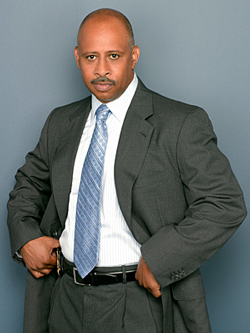On Friday, April 17, Dr. Aaron X. Smith and Tony Award-winning actor, director and playwright, Ruben Santiago-Hudson, hosted a race conference on “Using Popular Culture and Media for Accessing the Criminal System.”
Elaborating on his peace mission, Santiago-Hudson begins by speaking about African Americans living on the periphery, cultural intelligence, societal conformity, racial misrepresentation and police brutality. It is undeniably true that when we ask questions about the history of this nation, educators and representatives often leave out the contributions that African Americans, and minorities as a whole, have made towards this country’s structure and work ethic. One part of Santiago-Hudson’s presentation was especially significant. He said, “When people profess history, they’re often the stars of that history.” So the question is: how do we include society in this peace mission? How do we spread awareness?
Smith spoke mostly about media and hip-hop’s contribution to the pursuit of equal humanity. Well known music artists from the 90’s like Tupac and Biggie Smalls rapped about African American legacy and the pursuit of justice, but hip-hop is not always viewed with respect because people cannot think outside of the destructive paradigm of today’s society. Hip-hop is the only one telling the story, and it is the same system of paradigm that highlights only the negative. With police brutality—a subject that is especially familiar to us with the current injustices performed by our law enforcement—we now take a look at how blacks are misrepresented. We hear it all the time on the news: Ferguson, Mike Brown, the recent shooting of Eric Harris. It is the negative images that society places on people of color that allows authority to brutalize them.
The images of our nation today are so distorted that it seems as if society holds a vengeance. For instance, if we decide to speak about rape and someone were to say, “Some girls are asking to get raped because they come out of their house with cropped tops and short shorts.” Now, after hearing that, someone will eventually start verbally and maybe even physically attacking the person that says this because “Rape is wrong!”, but in equivalence, society has been able to make a connection between a man who wears his pants low for the common thug or someone who needs to be controlled and maintained by the system. Isn’t this wrong too? Both of these assumptions made off of someone’s attire are unacceptable, but somehow society fails to view it this way.
With this subject in mind, I asked Santiago-Hudson, “Blacks are somehow always linked to injustice in modern media, even if it’s to display how corrupt our law enforcement is. Blacks have the same rights as the common Caucasian man. But, what’s more effective? Informing and educating society on African American significance or displaying how misrepresented they are as a race with the help of law enforcement corruption and the destructive paradigm?”
Santiago-Hudson responded, “Well I think once we educate, once we teach the misconceptions of who we are, they will start to disintegrate. We have a long, long journey, but we have to educate– we have to include our whole history in the curriculums. And then, people’s misconceptions of who we are will start to evaporate and go away. It’s going to be [a while], but education is the key. Malcolm X said ‘Education is the key, the best path for our future because tomorrow belongs to the people who prepare for it today.’ So we have to prepare now, so we can have a better future tomorrow.”
Santiago-Hudson currently has a play running in the theatre called, Your Blues Ain’t Sweet Like Mine. The play is completely unadulterated and displays the learning process of transformational power—using theatre as a catalyst for social change.
IMAGE COURTESY of castle.wikia.com



